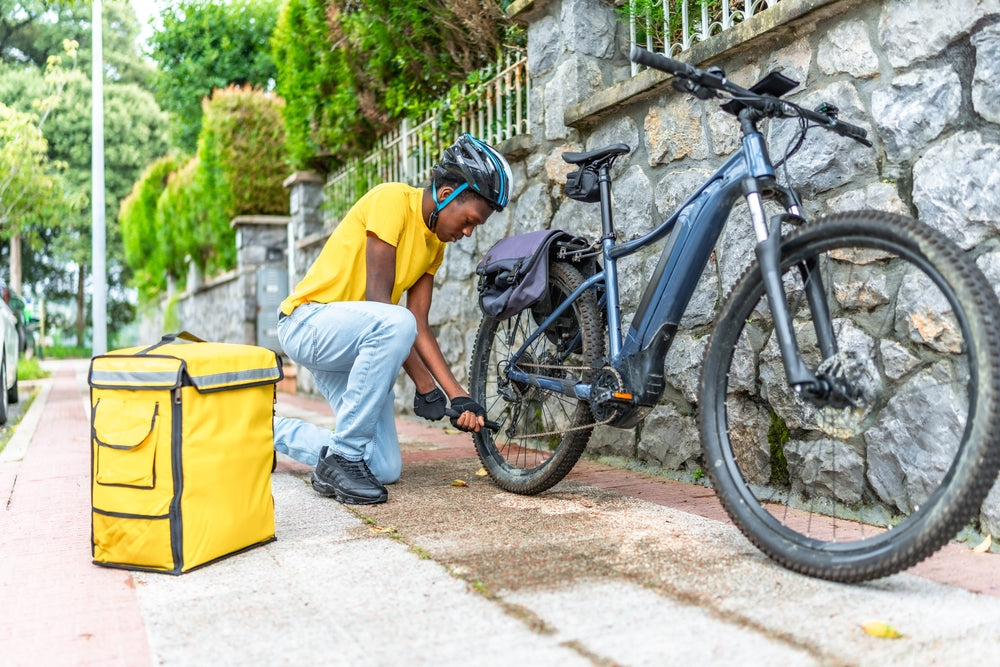Electric bikes are everywhere now. But are they actually good for the planet?
The short answer is yes. A single e-bike can reduce CO2 emissions by 225 kilograms each year when it replaces car trips. That's a big deal.
But there's more to the story. Let's look at what really happens when you switch from a car to an electric bike.
How Much Pollution Do E-Bikes Actually Create?
E-bikes aren't perfect. They do have an environmental footprint, especially during manufacturing.
Making an e-bike produces around 134kg of CO2. That's because the battery needs lithium, cobalt, and nickel. Mining these materials takes energy.
Compare that to a car. A small hatchback creates 5,500kg of CO2 just to manufacture. An SUV? Up to 13,000kg.
The difference is huge. And it gets better when you actually use the bike.
What Happens When You Ride
Here's where e-bikes shine. When you're riding an e-bike, it uses about 9 grams of CO2 per kilometer. A regular car? 271 grams.
That's 30 times less pollution. Every single trip.
E-bikes also use way less electricity than electric cars. Charging an e-bike costs just over 6 cents for a full battery. You can ride 20 to 60 miles on that charge.
E-Bikes vs Cars: The Real Numbers
Let's break down the full picture. This includes making the vehicle, using it, and disposing of it at the end of its life.
Lifetime Emissions Comparison
| Vehicle Type | Total CO2 (200,000 km) | CO2 per Mile |
|---|---|---|
| Electric Bike | 3 tonnes | 2.5-5g |
| Electric Car | 50.5 tonnes | 150g |
| Gasoline Car | 57.5 tonnes | 404g |
The numbers tell a clear story. E-bikes produce 94% less emissions than both gas and electric cars over their lifetime.
That's not a small difference. It's massive.
Why E-Bikes Win
The main reason is weight. E-bikes weigh 20-30kg. Cars weigh 1,500-2,000kg. Moving a heavier object takes more energy. Always.
E-bikes are also more efficient. They're 10 to 30 times more efficient than electric cars at fighting climate change.
What About the Battery?
This is the part people worry about most. And they should pay attention to it.
E-bike batteries do have an environmental cost. But it's smaller than you think.
Battery Production
An e-bike battery holds 400-800 watt-hours of energy. An electric car battery? 50,000-100,000 watt-hours.
That's 125 times bigger. More materials. More mining. More energy to make.
The battery accounts for about 40-50% of an e-bike's total manufacturing emissions. But the whole bike still creates way less pollution than any car.
Battery Recycling
Here's the good news. 95% of battery materials can now be recovered through recycling.
And recycling is much better than mining new materials. It produces 58-81% fewer greenhouse gases, uses 72-88% less water, and requires 77-89% less energy.
In France, 80% of e-bike batteries are properly recycled. That number's growing.
Many bike shops now take old batteries. Programs like Hungry for Batteries make it easy to recycle.
How Long Do Batteries Last?
A typical lithium-ion battery handles about 500 full charging cycles before losing capacity. That's usually 3-5 years of regular use.
You can extend battery life by:
- Not overcharging it
- Storing it at 50-80% charge
- Keeping it at room temperature
- Unplugging it when full
Beyond Carbon: Other Environmental Benefits
E-bikes do more than just reduce CO2. They help the environment in other ways, too.
Cleaner Air
Cars release nitrogen oxides, carbon monoxide, and particulate matter. These pollutants cause respiratory problems and smog.
E-bikes release none of these. Zero. They run on electricity and produce no tailpipe emissions.
Less Space, Less Damage
Cars need roads, parking lots, and garages. All that pavement creates problems. It contributes to flooding, increases urban temperatures, and destroys wildlife habitat.
E-bikes need much less space. More bikes mean we can reduce the amount of pavement we need. That's better for everyone.
Quieter Cities
Traffic noise is a real health problem. It causes stress, sleep problems, and heart issues.
E-bikes are nearly silent. More bikes mean quieter neighborhoods.
The Cost Comparison
Environmental impact isn't the only consideration. Cost matters too.
Upfront Costs
| Item | Cost Range |
|---|---|
| New E-Bike | $1,000 - $5,000 |
| Used Car | $26,500+ |
| Used Motorcycle | $4,000 - $10,000 |
| Electric Car | $30,000 - $60,000 |
Operating Costs
Cars cost about $900 per month to own and operate. That includes gas, maintenance, insurance, and registration.
E-bikes? Way less.
- Electricity: Less than a penny per mile
- Maintenance: $100-150 per year
- Insurance: Usually not required
- Registration: Not needed in most places
You save money and help the environment. Both.
What About Energy Sources?
Where your electricity comes from matters.
If your power comes from coal plants, your e-bike's emissions go up a bit. But even with coal power, e-bikes still produce far less pollution than any car.
With renewable energy like solar or wind, e-bikes are almost emission-free during use.
Many people charge their e-bikes at home with solar panels. That makes them even cleaner.
Who Benefits Most from Switching?
Not everyone can replace all their car trips with an e-bike. But many people can replace some trips.
Best Situations for E-Bikes
E-bikes work great when:
- Your commute is under 15-20 miles
- You live in an area with bike lanes
- You need to carry moderate cargo
- You want exercise without exhausting yourself
- You make frequent short trips around town
When Cars Still Make Sense
Cars are still necessary for:
- Long-distance trips over 50 miles
- Transporting large items regularly
- Severe weather conditions
- Areas without safe cycling infrastructure
- Multiple passengers every day
The best approach? Use an e-bike when you can. Use a car when you must.
The Bigger Picture: What Happens if More People Switch?
The potential impact is enormous.
Research shows that if e-bikes replaced feasible car trips in England alone, it could cut CO2 emissions by 24.4 million tonnes per year.
That's the equivalent of taking millions of cars off the road.
Rural areas actually have the highest potential. People in rural areas and suburbs could reduce CO2 by over 750kg per person annually by switching to e-bikes.
Cities benefit too. Not as much per person, but the total impact adds up fast with dense populations.
Making Your E-Bike Even Greener
Once you have an e-bike, you can make it even more environmentally friendly.
Buy Smart
- Look for brands with strong recycling programs
- Choose bikes with recyclable aluminum frames
- Consider used e-bikes to extend product lifecycles
- Pick lithium iron phosphate batteries when possible (they last longer)
Use It Right
- Charge with renewable energy if you can
- Do regular maintenance to extend the bike's life
- Ride it instead of driving whenever possible
- Store the battery properly during winter
End of Life
- Return your battery to a recycling program
- Don't throw batteries in regular trash
- Donate or sell your bike when you're done with it
- Recycle the frame and components
Many bike shops participate in Call2Recycle battery programs. They make recycling easy.
Common Concerns About E-Bike Environmental Impact
"Isn't the battery mining really bad?"
Yes, mining has environmental impacts. But here's the thing: one e-bike battery lasts for thousands of miles. Gas cars burn fuel constantly. The total impact is way lower for e-bikes.
Plus, battery recycling is getting better fast. By 2035, battery lifecycle emissions will drop by 35% thanks to better recycling and manufacturing.
"What about electricity from coal plants?"
Even with coal power, e-bikes beat cars. The energy efficiency is just too good.
And most grids are getting cleaner every year. As renewable energy grows, e-bikes automatically get cleaner too.
"Don't e-bikes end up in landfills?"
They can, but they shouldn't. And they don't have to.
Steel and aluminum frames are 100% recyclable. Batteries can be recycled at high rates. Many parts can be reused.
The industry is building better recycling infrastructure every year.
The Bottom Line: Should You Switch?
If you can replace even some car trips with an e-bike, the environmental benefit is clear.
You'll cut your carbon footprint significantly. You'll save money. You'll reduce air pollution. And you'll help make your community quieter and more livable.
E-bikes aren't perfect. Nothing is. But they're one of the best tools we have for sustainable transportation.
The impact of your switch matters. Each car trip you replace makes a difference. Multiply that by millions of people, and we're talking about real climate action.
The choice is yours. But the data is clear: electric bikes are genuinely better for the planet.





